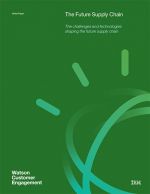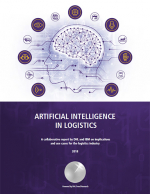IBM Wants to Make 2017 the Year of Blockchain Enterprise Deployment
This IDC Vendor Profile discusses IBM's blockchain strategy, existing portfolio around this technology, and specific use cases, defines blockchain and outlines its benefits and current limitations and describes IBM's engagement with the technology since 2014 and its current offering.
2017 is the year that will make or break the case for viable enterprise adoption of blockchain, one of the newest and potentially groundbreaking transformative technologies.
This IDC Vendor Profile explores the blockchain story of IBM, a player that very much stands out in the quickly forming blockchain environment.
IBM currently finds itself in a good position in an emerging enterprise blockchain market due to a wellformulated and well-communicated blockchain strategy.
This strategy is an initiative of IBM Bluemix Garage, which includes multidisciplinary blockchain teams, and a strategic decision to move into the blockchain space very early on (in 2014) and assert itself as one of the leaders in the Hyperledger Project.
Key insights into IBM's blockchain strategy include:
- IBM's goal for blockchain is to develop enterprise-ready solutions that overcome existing limitations of the technology in terms of privacy, confidentiality, auditability, performance, and scalability. This involves primarily increasing speed and security of blockchain operations to meet enterprise requirements, and developing platforms for permissioned networks to enable proper enterprise governance models and networks in which members with specified information access are not only permissioned but are also private.
- IBM has launched the first production of its large-enterprise blockchain, which solves transaction disputes in the IBM Global Financing (IGF) program. Thanks to a comprehensive view of operational data from purchase orders to remittances consolidated and distributed to all parties in the transactional ledger, IBM estimates it will decrease the amount in dispute from $100 million a year to $30 million and reduce average dispute resolution time from 44 to 10 days.
- IBM has announced multiple enterprise deployments within as well as outside the financial services sectors for 2017. This includes CLSNet, a bilateral payment netting solution for CLS Group's foreign exchange market products and currencies, and a smart contracts solution for the Bank of Tokyo-Mitsubishi UFJ. Notable proofs of concept (POCs) were announced recently, including a know-your-customer (KYC) identity management solution for Crédit Mutuel Arkéa; an end-to-end food traceability system for Walmart; transaction management among a network of shippers, freight forwarders, ocean carriers, ports, and customs authorities working with Maersk; and consumer digital identity with SecureKey. IDC suggests that IBM capitalize on its successful blockchain take-off by establishing conversations with regulators to see whether it could be possible to mandate the use of blockchain in areas that would benefit from it.
Advice for IBM
IBM is quickly emerging as a strong candidate for a leader in blockchain enterprise adoption.
Dowload this paper and find out what advice IDC provides IBM based on an analysis of its existing strategy.
What’s Related




Favorites





